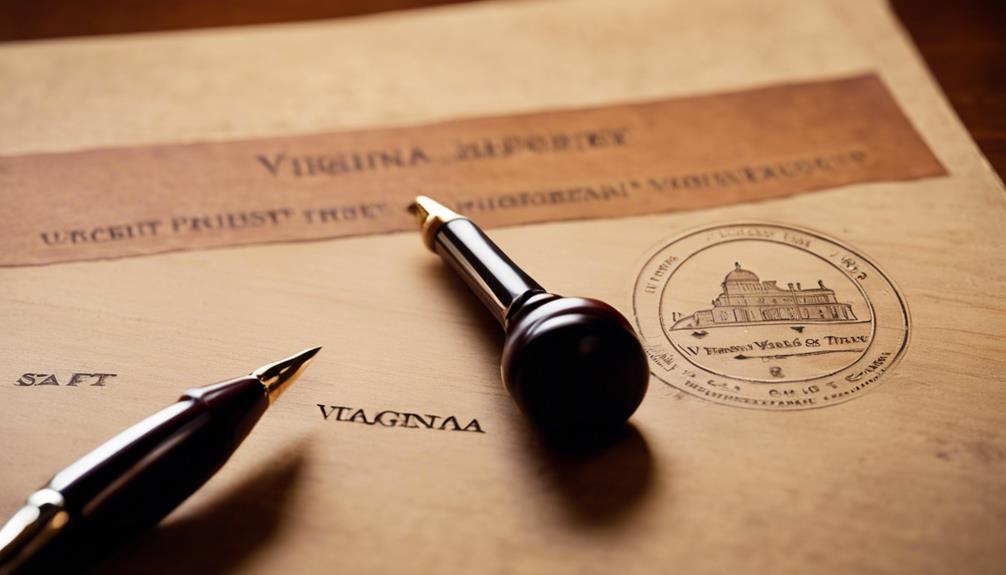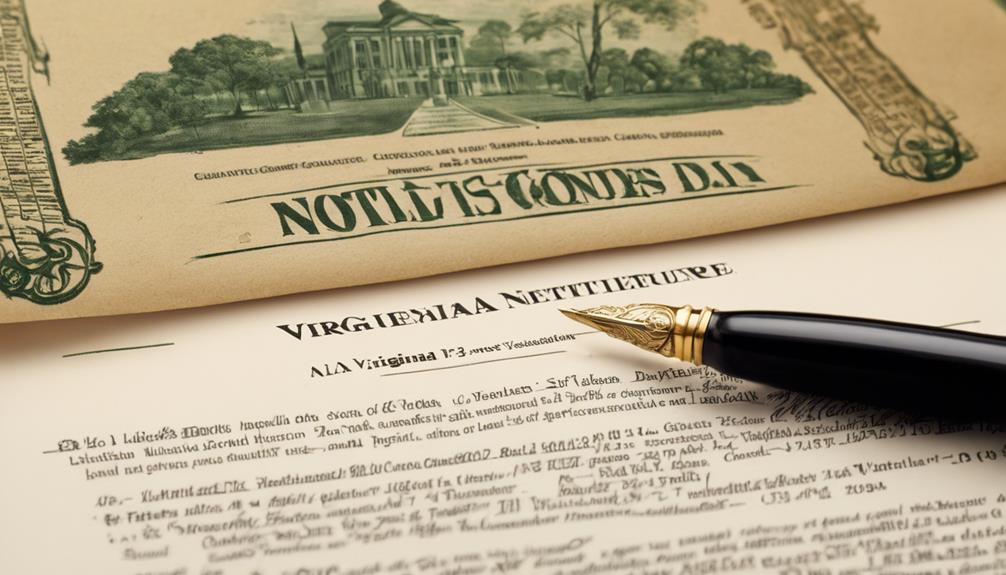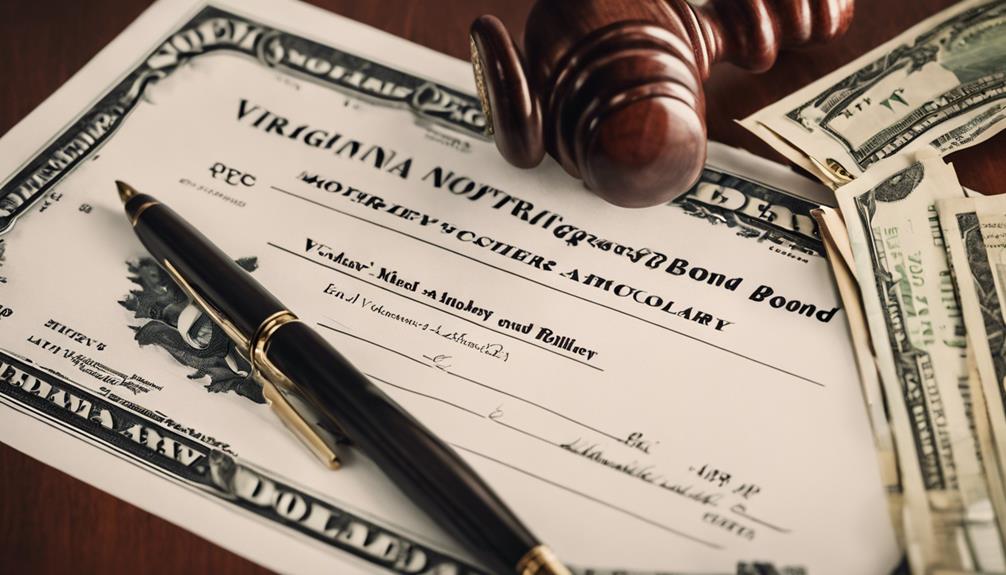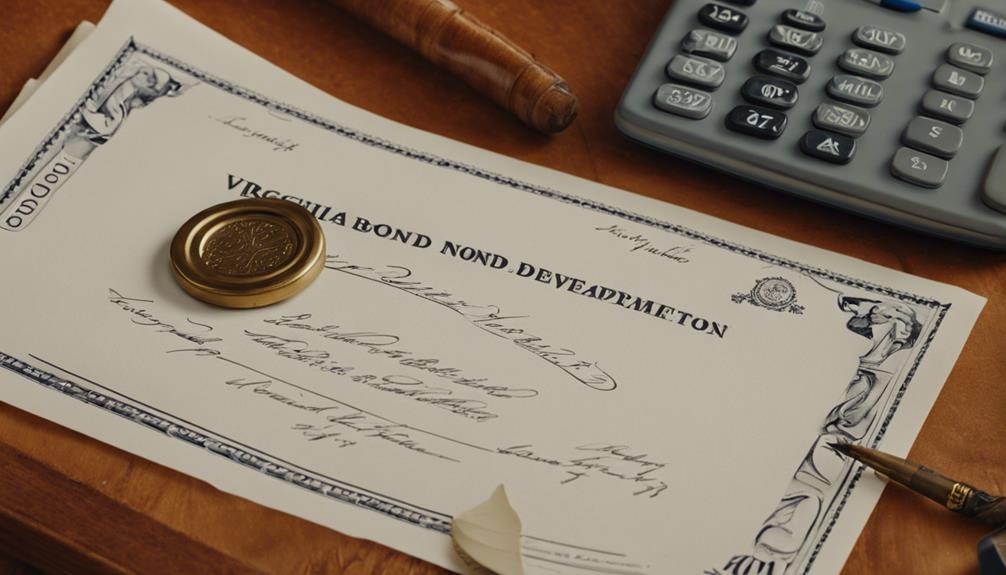When you consider becoming a Virginia Notary Public, understanding the significance of the $25,000 bond is crucial. This bond not only protects the public from potential misconduct but also demonstrates your commitment to professionalism and ethical conduct. You might wonder what specific requirements are involved and how to secure this bond effectively. Additionally, it's important to grasp the implications of maintaining this bond throughout your term. So, what steps do you need to take to ensure compliance and safeguard your notarial duties?
What Is a Notary Public Bond?

A notary public bond is a type of surety bond that protects the public from potential misconduct by a notary. When you engage a notary's services, you expect honesty and integrity in their actions. The bond serves as a financial safety net, ensuring that if a notary acts improperly—like committing fraud or failing to uphold their duties—you have a means of recourse.
The bond amount varies by state, and in Virginia, it typically ranges from $10,000 to $25,000. You, as a notary, must secure this bond before you can officially perform notarial acts. This process usually involves paying a premium to a bonding company, which then provides the bond.
Once you've obtained the bond, it must be filed with the appropriate state authority, often the Secretary of the Commonwealth in Virginia. This bond remains in effect during your term as a notary, so keeping it active is crucial.
If a claim is made against your bond due to misconduct, the bonding company may cover the financial damages, but you'll ultimately be responsible for repayment. Understanding this bond is vital as it upholds the trust between you and the public you serve.
Importance of the Bond
Understanding the significance of the notary public bond is key to appreciating its role in the notary profession. This bond serves as a safety net for the public, protecting them from potential misconduct or errors you might commit while performing your duties. It ensures that you take your responsibilities seriously and act with integrity.
If you make a mistake or engage in fraudulent behavior, the bond provides a financial remedy for any damages incurred. This reassurance fosters trust, allowing clients to feel secure when relying on your services. Without this bond, your role as a notary could be seen as less credible, and individuals may hesitate to engage with you.
Moreover, having a notary public bond is often a requirement for you to legally operate in Virginia. It not only legitimizes your authority but also elevates your professional standing. By fulfilling this obligation, you demonstrate your commitment to ethical practices and accountability.
In short, the importance of the notary public bond lies in the protection it offers both you and the public, enhancing your credibility and reinforcing the trust that's essential in your profession.
Bond Requirements in Virginia

Navigating the bond requirements in Virginia is essential for anyone looking to become a notary public. In Virginia, you're required to obtain a notary bond worth $25,000. This bond acts as a safety net, protecting the public from potential errors or misconduct in your notarial duties.
Before you can start the bonding process, you need to fulfill specific eligibility criteria. You must be at least 18 years old, a legal resident of Virginia, and proficient in English.
Once you've confirmed your eligibility, you can begin seeking a bonding company. It's crucial to choose a reputable provider that understands the state's regulations.
After securing a bond, you'll receive a bond certificate, which you'll need to submit with your notary application to the Secretary of the Commonwealth. Keep in mind that your bond must remain in effect for your entire notary term, usually four years.
If you ever make a mistake that leads to a claim against your bond, it's your responsibility to resolve it. Understanding these requirements ensures you're well-prepared to navigate the process of becoming a Virginia notary public.
How to Obtain a Notary Bond
Once you've confirmed your eligibility to become a notary public in Virginia, the next step is to obtain your notary bond. This bond acts as a safety net for the public against any potential mistakes or misconduct in your notarial duties.
To get your bond, start by researching reputable bonding companies. You can often find these companies online or through local insurance agents. Once you've narrowed down your options, reach out to them for quotes and details about their services.
After selecting a bonding company, you'll need to complete an application. This usually requires providing some personal information, including your name, address, and details about your notary commission.
The bonding company may also conduct a background check to ensure you meet their requirements.
Once your application is approved, you'll receive the bond document. Be sure to read it carefully to understand your obligations.
After you've secured your bond, you'll need to file it with the Virginia Secretary of the Commonwealth as part of your notary application process. This step is crucial to officially becoming a notary public in Virginia.
Cost of a Notary Public Bond

The cost of a notary public bond in Virginia typically ranges from $50 to $100, depending on the bonding company and the coverage amount you choose. When you're looking for a bond, be sure to compare quotes from different providers. Some companies may offer lower rates, but it's important to consider the reputation and reliability of the bonding company as well.
In addition to the bond cost, you might also encounter fees for additional services, such as notary training or administrative support. Don't forget to factor in these potential expenses when budgeting for your notary public bond.
If you're a new notary, you may find that some companies offer discounts for first-time buyers or package deals that include other necessary supplies like a notary seal or journal. It's worth asking about these options to save some money.
Ultimately, the cost of your notary bond is a small investment in your notary career, but it's crucial to choose a bond that meets Virginia's legal requirements.
Ensure you understand the terms before making a purchase so you can avoid any surprises down the line.
Renewing Your Notary Bond
Keeping your notary bond up to date is vital for maintaining your authority as a notary public in Virginia. Not only does this ensure you comply with state regulations, but it also protects you and your clients against potential liabilities.
You'll need to renew your bond before it expires, typically every four years.
To start the renewal process, check the expiration date on your current bond. Reach out to your bonding company or agent to discuss the renewal terms. They may ask for updated information or documentation, so be prepared to provide any necessary details.
Once you've secured your new bond, make sure to review it carefully for accuracy. After that, file the new bond with the Virginia Secretary of the Commonwealth, along with your updated notary application if required.
Lastly, keep a copy of your renewed bond in your records, as it may be needed for future reference or when performing notarizations.
Staying on top of your bond renewal not only helps you maintain your notary status but also strengthens your credibility in the field.
Common Questions About Notary Bonds

Many notaries have questions about bonds, and understanding these can help you navigate your responsibilities more effectively. One common question is, "What exactly is a notary bond?" A notary bond is a type of insurance that protects the public from potential mistakes or misconduct in your notarizations. If you make an error, the bond ensures that affected parties can receive compensation.
Another frequent inquiry is about the bond amount. In Virginia, the standard bond amount is $15,000, but this can vary based on your specific needs or the requirements of your employer.
You might also wonder, "How long does a notary bond last?" Typically, bonds are valid for four years, aligning with your notary commission.
You may also ask, "Do I need to renew my bond?" Yes, you must renew your bond each time you renew your notary commission.
Lastly, some notaries question whether they can perform notarizations without a bond. The answer is no; having a bond is a legal requirement in Virginia.
Understanding these aspects can help you fulfill your obligations as a notary public confidently.
Conclusion
In summary, securing a Virginia Notary Public Bond is essential for your notarial career. It not only protects the public from misconduct but also showcases your commitment to professionalism and legal compliance. By understanding the bond requirements and renewal process, you can ensure you meet your obligations as a notary. Stay informed, maintain your bond, and you'll build trust with your clients while protecting yourself from potential liabilities.

